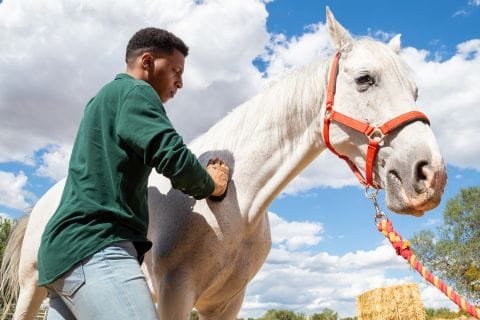Essential Skin and Coat Care for Your Horse
Caring for your horse’s skin and coat is essential for their overall health and well-being. A shiny, healthy coat not only looks great but also indicates that your horse is in good condition. Here’s a guide to help you maintain your horse’s skin and coat, ensuring they stay healthy and vibrant.
1. Regular Grooming
One of the most important aspects of coat care is regular grooming. Grooming not only removes dirt, dust, and debris but also helps to distribute natural oils in the skin. Here are some grooming tips:
- Use the Right Tools: A good set of grooming tools includes a curry comb, stiff brush, soft brush, and hoof pick. Start with the curry comb to loosen dirt and hair, then use the stiff brush to remove it. Finish with the soft brush for a final shine.
- Frequency: Aim to groom your horse at least once a day, especially if they are active or spend time in the pasture. This routine helps prevent skin issues and promotes a healthy coat.
2. Bathing
While grooming is essential, occasional bathing can also be beneficial. However, it’s important to do it correctly to avoid stripping the coat of its natural oils.
- Choose the Right Shampoo: Use a mild, pH-balanced horse shampoo. Avoid human shampoos, as they can irritate the skin.
- Bathing Frequency: Depending on your horse’s activity level and environment, bathing every few weeks may be enough. In warmer weather, you can bathe more often to help keep them cool and clean.
- Rinse Thoroughly: Ensure you rinse out all the shampoo to prevent residue buildup, which can lead to skin irritation.
3. Nutrition Matters
A healthy coat starts from the inside. Providing your horse with a balanced diet is crucial for skin and coat health.
- High-Quality Feed: Make sure your horse is receiving high-quality forage and grains that meet their nutritional needs. Look for feeds rich in essential fatty acids, which can promote a shiny coat.
- Supplements: Consider adding omega-3 and omega-6 fatty acid supplements to your horse’s diet. These can improve skin health and enhance coat shine.
4. Hydration
Proper hydration is vital for maintaining healthy skin and a glossy coat. Always provide fresh, clean water for your horse, especially after exercise or during hot weather. Dehydration can lead to dry skin and a dull coat.
5. Protect from the Elements
Horses can be exposed to various weather conditions that may affect their skin and coat. Here are some protective measures:
- Shade and Shelter: Ensure your horse has access to shade in the summer and shelter in the winter. Extreme temperatures can cause stress and impact coat health.
- Fly Protection: In warmer months, flies and insects can irritate your horse’s skin. Consider using fly masks, sheets, or repellents to keep them comfortable.
6. Regular Health Check-ups
Regular veterinary check-ups are essential for monitoring your horse’s overall health, including their skin and coat. Your vet can spot potential issues like allergies, parasites, or infections that could affect your horse’s skin.
- Parasite Control: Implement a regular deworming schedule as parasites can cause skin irritation and coat problems.
- Skin Conditions: Watch for signs of skin issues such as redness, bumps, or excessive itching. Early detection and treatment are key to preventing serious problems.
7. Seasonal Coat Changes
Horses naturally shed their coats twice a year. During the spring and fall, you may notice your horse shedding more than usual.
- Be Patient: Allow your horse to shed naturally, but assist with regular grooming to help remove loose hair.
- Diet and Care: Continue providing good nutrition and grooming during shedding seasons to support healthy new hair growth.




